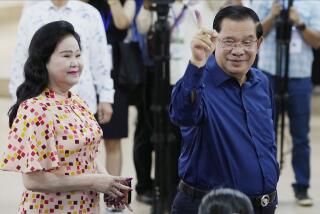Solomon, in His Wisdom, Would Listen to Sihanouk : Cambodia: The people won’t have a chance to decide their fate if the exclusion of any party results in civil war.
- Share via
SINGAPORE — Long before the era of genetic fingerprinting, King Solomon was asked to decide which of two prostitutes was the real mother of a baby sat before him. He called for his sword and offered to cut the baby in half. The false mother agreed. The real mother, gripped by the vision of her baby being ripped apart, offered the baby to the other woman. King Solomon rewarded her with the baby.
In Paris, several countries and four Cambodian parties met two months ago to discuss the fate of Cambodia. Three of the parties, led by Prince Sihanouk, proposed that after the Vietnamese withdrawal, there should be peace and national reconciliation among all four of the Cambodian parties. They should all return to Phnom Penh, the capital city, and share power temporarily until the Cambodian people decided who should rule them. Sihanouk argued that if any of the four parties was kept out of Phnom Penh, civil war would break out. There would be continued bloodshed in Cambodia.
The fourth Cambodian party, Hun Sen, rejected the proposal. Having established himself in Phnom Penh with the support of the Vietnamese army, Hun Sen refused to share power, thereby inviting the other parties to challenge him militarily. Who should the world support? Those who wish to restore peace in Cambodia or those who wish to rip it apart? Curiously, some modern-day incarnations of King Solomon want to support Hun Sen and a civil war in Cambodia. How strange!
There is a reason for this curious behavior. The specter of Pol Pot, who has become the incarnation of absolute evil, looms large in their minds. Today’s King Solomons want to see the exclusion of all Pol Pot-ists from Phnom Penh. Paradoxically, to achieve this, they propose that the world support a group of apparently reformed Pol Pot-ists led by Hun Sen. He and many of his colleagues in Phnom Penh were part of Pol Pot’s tribe in the bloodiest years of Cambodia’s repression, up to 1977. Twelve years later, one section of that tribe is described as sinners. Another section, led by Hun Sen, is described as saints.
Even more curiously, both the saints and sinners were foisted upon the Cambodians by the Vietnamese. Pol Pot led an insignificant rebel force until 1970, when Vietnam decided that Pol Pot would be built up as a useful instrument to remove the Cambodian government, then led by a hapless Lon Nol, who had the audacity to object to the Vietnamese presence in Cambodia.
Lon Nol’s army was decimated by the Vietnamese, who then proceeded to propel Pol Pot toward power. Foolishly, Pol Pot then decided to bite the hand that fed him. In response, the Vietnamese lured away members of Pol Pot’s tribe who were sympathetic to them and, after a blitzkrieg military operation, set up a puppet regime controlled by these former Pol Pot-ists, now led by Hun Sen.
Out of weakness, Hun Sen has not repeated the ruthless and bloody rule of Pol Pot. We are told now that his weakness should be remedied.
If the real King Solomon were alive, one wonders whether he would have suggested that the solution to Cambodia’s travails is to decide that the Cambodian people are not babies. Despite the traumas they have undergone, they are capable of choosing what government is right for them, if they are allowed to participate in elections under the right conditions, under which they are no longer dominated or terrorized by any Cambodian group.
Sihanouk proposed this solution in Paris, with the support of the ASEAN countries (Brunei, Indonesia, Malaysia, Philippines, Thailand and Singapore) and several other countries, which felt ultimately that the only long-term solution to the Cambodian problem is for the Cambodian people to decide what is good for them. However, the Cambodians annot make a free choice if the elections take place either under conditions of civil war or under a government controlled by any of the four parties.
To prevent this, Sihanouk proposed in Paris that an interim quadripartite government be set up in Phnom Penh and a strong international control mechanism be set up under U.N. auspices. Vietnam and Hun Sen opposed both of Sihanouk’s proposals. Who would King Solomon have supported if he were alive today: Hun Sen or Sihanouk?
More to Read
Sign up for Essential California
The most important California stories and recommendations in your inbox every morning.
You may occasionally receive promotional content from the Los Angeles Times.













